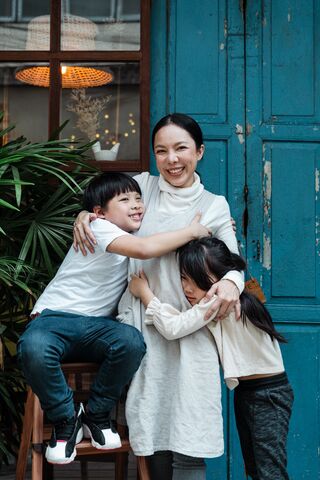Parenting
Can Parents Be Both Individualist and Collectivist?
Cultures and families evolve over time in response to social transformations.
Posted January 15, 2022 Reviewed by Lybi Ma
Individualism is characterized by self-reliance and loose ties between individuals, whereas collectivism is characterized by interdependence between individuals and the subordination of individual goals for the good of the group. Historically, the individualist versus collectivist distinction has been one of the main organizing frameworks for understanding cultural differences in family life. For example, parents in individualist cultural groups have been thought to socialize their children to be self-reliant and independent, whereas parents in collectivist cultural groups have been thought to socialize their children to be obedient and fulfill their duties to their families.
However, neither cultures nor families are static over time. Instead, cultures and families evolve in response to social transformations, such as changing gender roles, urbanization, globalization, and technology uptake. Entire cultural orientations can shift, and changing demands resulting from social transformations can alter parents’ attitudes if they perceive that new parenting behaviors, child characteristics, or both will be more adaptive in altered social contexts.

Large-scale social changes are in part responsible for changes in parents’ attitudes. For example, the Internet and social media have dispersed global perspectives that were not part of traditional family discourse in the era before the Internet. Parenting has been shaped by exposure to different perspectives via technology, as well as through urbanization, globalization, and other social forces that change over time, and these exposures may have contributed to the melding of individualist and collectivist orientations. Individualism and collectivism are not polar opposites but instead can co-exist within a cultural group and even within an individual in different situations or at different times.
As a way of understanding mothers’ and fathers’ individualism and collectivism at this point in history, we examined parents in nine countries that varied widely in country-level rankings of individualism, from Colombia, China, and Thailand, which are among the least individualist countries in the world, to Kenya, Jordan, and the Philippines, which are slightly less individualist, to Sweden, Italy, and the United States, which is one of the most individualist countries in the world. (Country profiles of individualism are available here.) We included equal proportions of Black, white, and Latinx families in the United States.
When children were 10 years old, mothers and fathers completed a measure of individualism and collectivism in which they rated the importance of different values related to their autonomy and belonging to a social group. (For examples: “I’d rather depend on myself than others.” “To me, pleasure is spending time with others.”)
For both individualism and collectivism, we found bigger differences within countries than between countries. Within-country differences were more pronounced for collectivism than individualism. It is possible that a collectivist orientation taps into aspects of social relationships that are more universally valued across cultures than the aspects of self-reliance that are embodied in individualism so that variance in collectivism is more driven by within-culture factors, such as personality.
These findings support conceptualizations of individualism and collectivism as being discrete constructs rather than opposite ends of the same dimension. Correlations between mothers’ individualism and collectivism and fathers’ individualism and collectivism were modest and positive (.26 and .22, respectively). That is, mothers and fathers who were more individualist were also more, not less, collectivist. Although countries are often ranked or categorized in terms of whether they are more collectivist or individualist, individual parents (as well as countries) can have characteristics that are collectivist in addition to characteristics that are individualist. Particularly in the 21st century as parents have access to a diverse range of global perspectives through the Internet and social media and as they have experienced social changes associated with urbanization and globalization, parents may be even more likely today than in previous generations to have characteristics of both individualism and collectivism.
We found no consistent predictors of mothers’ individualism across cultural groups, but fathers who were more educated were less individualistic in 10 of the 11 cultural groups. Mothers’ collectivism was predicted by placing more importance on religion in all cultural groups, by lower father education in 10 of the 11 groups, and by higher family income in 8 of the 11 groups. Fathers’ collectivism was predicted by younger father age in 10 of the 11 groups. Other significant predictors were less consistent across cultural groups. These findings suggest that although individualism and collectivism have often been treated as country-level constructs, they can also be understood as being predicted by some individual-level factors.
Taken together, the findings suggest two main conclusions. First, differences in individualism and collectivism are accounted for more by within-culture than between-culture factors. Second, in ways that are largely consistent for mothers and fathers and across cultures, individualism and collectivism are predicted by a range of sociodemographic factors, especially mothers’ and fathers’ education and mothers’ reports of the importance of religion in their lives. Changing gender roles, urbanization, globalization, and technology uptake from the 20th to the 21st century may have contributed to some of the similarities between mothers and fathers and across the nine countries included in this study. As parents are affected by social contexts and also influence social change over time, understanding 21st-century parenting is dependent on understanding cultural and sociohistorical contexts in which parents are embedded.
References
Lansford, J. E., Zietz, S., Al-Hassan, S. M., Bacchini, D., Bornstein, M. H., Chang, L., Deater-Deckard, K., Di Giunta, L., Dodge, K. A., Gurdal, S., Liu, Q., Long, Q., Oburu, P., Pastorelli, C., Skinner, A. T., Sorbring, E., Tapanya, S., Steinberg, L., Uribe Tirado, L. M., Yotanyamaneewong, S., & Alampay, L. P. (2021). Culture and social change in mothers’ and fathers’ individualism, collectivism, and parenting attitudes. Social Sciences, 10, 459. https://doi.org/10.3390/socsci10120459


